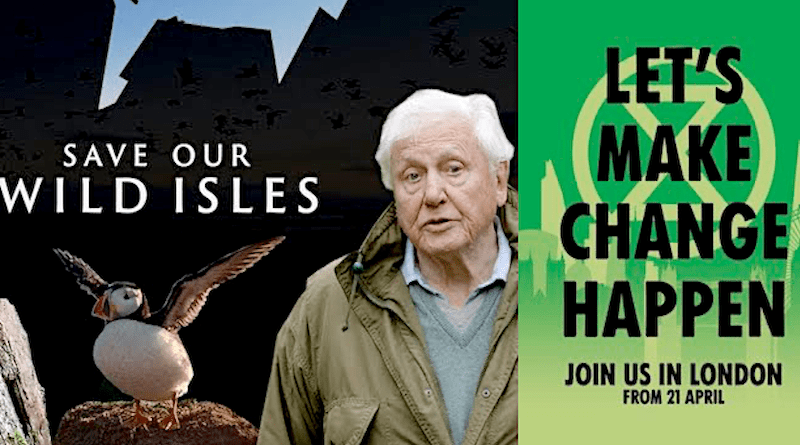David Attenborough’s ‘Saving The Wild Isles’: Powerful Message, But Urgent Concerted Direct Action Is Still Overwhelmingly Needed – OpEd
After watching the fifth and final episode of David Attenborough’s ‘Wild Isles’ series on BBC1, a three-year project that has provided a beautifully filmed and visually unprecedented perspective on the extraordinary wildlife of the UK, I watched the online-only extra episode, ’Saving the Wild Isles’, which, we heard last month, was only being shown on iPlayer “because of fears its themes of the destruction of nature would risk a backlash from Tory politicians and the rightwing press”, as the Guardian explained.
In the end, the programme failed to present what we had been led to expect — “images of rivers polluted with plastics, sewage and pesticides, tales of dwindling numbers of insects, birds and mammals, of ancient woodlands destroyed, overfished seas, mature urban trees felled, meadows ploughed, raptors such as golden eagles poisoned, the climate crisis running amok”, as Dave Goulson, professor of biology at the University of Sussex, explained in a critical article for the Guardian today, entitled, ‘David Attenborough’s online Wild Isles isn’t too hard-hitting for TV — it doesn’t go far enough.’
Instead, ’Saving the Wild Isles’ was an uplifting endorsement of ‘rewilding’, focusing on important efforts across the country by farmers, ecologists and volunteers to undo the worst effects of industrial, pesticide-driven agriculture, to ‘rewild’ denuded nature (with a particular focus on the Cairngorms), and to re-plant vital, wildlife-supporting sea meadows on the ravaged ocean floor. For Londoners, there was even a focus on the inspiring work restoring nature to the River Lea at Cody Dock, a formerly heavily polluted industrial site in Canning Town, which everyone in the capital should visit.
I wouldn’t want to belittle Attenborough’s efforts — and the RSPB, the WWF and the National Trust, who worked on the programme — to get people involved in projects like these. I found the programme genuinely inspiring, although even on its own terms what kept occurring me was the need for these projects to be scaled up — a hundred-fold, a thousand-fold.
It could all be done if the political will existed to make the UK a leader in ‘rewilding’ and in transitioning to a green economy, and the programme —and the series as a whole — didn’t flinch from mentioning, repeatedly, that we have become “one of the most nature depleted countries in the world”, but ‘rewilding’, encouraging people to get involved in projects to save and revive nature, and placing hope above anger can only go so far.
The series as a whole, for example, focused relentlessly on water. How could it not, when it focused on a country with vast shorelines, and when nature, in all its forms, depends on water? And yet, there was no mention of how, as Dave Goulson described it, “Raw sewage is being dumped into England’s rivers on average 800 times a day.”
There is, arguably, no greater scandal than this perpetual sh*tshow, facilitated because, in 1989, England and Wales became the only countries in the world to have a fully privatised water and sewage disposal system. Wales has recently opted out of this model, but in England, as the ‘We Own It’ website explains, “Privatisation is a legalised scam. Shareholders receive £2 billion a year on average. Since the 1990s, investment from the privatised English water companies has gone down 15%, and they’ve built up a debt mountain of £53 billion (paid for by us).” The CEOs of the water companies are paid millions, as the inewspaper explained last year, ”even as billions of litres of sewage are poured into the country’s rivers and oceans.”
The re-nationalisation of our water companies ought to be at the top of our political priorities, and yet, as with other urgently needed policies — a ban on all new oil, gas and coal extraction, as part of our commitment to reducing our greenhouse gas emissions by at least 45% by 2030 — it is being deliberately ignored by our government.
In conclusion, then, the urgency of the climate crisis wasn’t really highlighted by David Attenborough, despite him stating, rather eloquently, “We now have a few short years during which we can still make a choice. Where just enough of the natural world remains for it to recover. This starts and ends with us. Every one of us, no matter where we live, can and must play a part in restoring nature to our isles. Never has it been more important to do this for ourselves and for our wildlife. This is our home, and this is the moment. We have just enough time and just enough nature left to save our wild isles for our children, and for future generations.”
These were fine words, of course, and they will undoubtedly have a role to play in persuading nature-loving but non-radical Brits (an important demographic) to take the UK’s depletion of nature seriously, as well as helping others stay on the right side of debilitating despair when it comes to the climate crisis.
However, urgent action is also required, and for that I’m hoping that anyone in the UK who is reading this will come to London from Friday April 21 to Monday April 24 for what Extinction Rebellion are calling ‘The Big One’, an effort to get 100,000 people together to demand urgent change, which is supported by over 130 other organisations.
I hope to see you there.

